MARK GRIFFITH is professor of classics and of theater, dance, and performance studies at the University of California, Berkeley.
GLENN W. MOST is professor of ancient Greek at the Scuola Normale Superiore at Pisa and a visiting member of the Committee on Social Thought at the University of Chicago.
DAVID GRENE (19132002) taught classics for many years at the University of Chicago.
RICHMOND LATTIMORE (19061984), professor of Greek at Bryn Mawr College, was a poet and translator best known for his translations of the Greek classics, especially his versions of the Iliad and the Odyssey.
The University of Chicago Press, Chicago 60637
The University of Chicago Press, Ltd., London
2013 by The University of Chicago
The Eumenides 1953, 2013 by the University of Chicago
Philoctetes 1957, 2013 by the University of Chicago
Oedipus at Colonus from Sophocles: The Oedipus Cycle, translated by Dudley Fitts and Robert Fitzgerald. 1941 by Houghton Mifflin Harcourt Publishing Company. Copyright renewed 1969 by Robert Fitzgerald. Reprinted by permission of Houghton Mifflin Harcourt Publishing Company
The Bacchae 1959, 2013 by the University of Chicago
Alcestis 1955, 2013 by the University of Chicago
All rights reserved. Published 2013.
Printed in the United States of America
22 21 20 19 18 17 16 15 14 13 1 2 3 4 5
ISBN-13: 978-0-226-03576-5 (cloth)
ISBN-13: 978-0-226-03593-2 (paper)
ISBN-13: 978-0-226-03609-0 (e-book)
Library of Congress Cataloging-in-Publication Data
Greek tragedies / edited by David Grene and Richmond Lattimore. Third edition / edited by Mark Griffith and Glenn W. Most.
pages. cm.
ISBN 978-0-226-03514-7 (cloth : alk. paper) ISBN 978-0-226-03528-4 (pbk. : alk. paper) ISBN 978-0-226-03531-4 (e-book) ISBN 978-0-226-03545-1 (cloth : alk. paper) ISBN 978-0-226-03559-8 (pbk. : alk. paper) ISBN 978-0-226-03562-8 (e-book) ISBN 978-0-226-03576-5 (cloth : alk. paper) ISBN 978-0-226-03593-2 (pbk. : alk. paper) ISBN 978-0-226-03609-0 (e-book) 1. Greek drama (Tragedy) I. Grene, David. II. Lattimore, Richmond, 19061984. III. Wyckoff, Elizabeth, 1915 IV. Most, Glenn W. V. Griffith, Mark (Classicist) VI. Sophocles. Antigone. English. 2013. VII. Sophocles. Oedipus Rex. English. 2013. VIII. Aeschylus. Agamemnon. English. 2013. IX. Aeschylus. Prometheus bound. English. 2013. X. Euripides. Hippolytus. English. 2013.
PA3626.A2G57 2013
882.0108dc23
2012044399
 This paper meets the requirements of ANSI/NISO Z39.481992 (Permanence of Paper).
This paper meets the requirements of ANSI/NISO Z39.481992 (Permanence of Paper).
CONTENTS
Translated by Richmond Lattimore
Translated by David Grene
Translated by Robert Fitzgerald
Translated by William Arrowsmith
Translated by Richmond Lattimore
AESCHYLUS
Translated by Richmond Lattimore
INTRODUCTION TO AESCHYLUS THE EUMENIDES
The Eumenides was presented in 458 BCE as the last tragedy in the trilogy called the Oresteia. The other plays in the trilogy are Agamemnon and The Libation Bearers. Each of the three can be studied and interpreted as an independent drama, in isolation from the other two.
When Orestes murdered his mother, he did so at the command of Apollo, but even Apollo could not by formal absolution drive away her Furies (ultimately canonized as the Eumenides), who pursued the murderer up and down the world. At last the case was brought to Athens and tried by law, before a jury of Athenian citizens, with Athena presiding as judge (and also participating in the voting), the Furies acting as prosecutors, and Apollo as counsel for the defense. Athena (who was born without a mother) voted in favor of the father, and Orestes was acquitted by the narrowest of margins. She then appeased the angry Furies (Eumenides) by establishing a cult for them near the Acropolis, as guardian spirits of Athens.
As a drama of atonement, absolution, and canonization, The Eumenides bears some resemblance to Sophocles Oedipus at Colonus. In both cases the hero, who feels himself to be morally blameless, is nevertheless contaminated by horrendous past actions and must be absolved. But Sophocles keeps his supernatural powers in the background. Aeschylus stages his; and his issues are public, not individual, as the story of the Argive House of Atreus in its rescue from recurrent bloodshed and revenge merges into the history of civilization at Athens.
THE EUMENIDES
Characters
THE PYTHIAN PRIESTESS OF APOLLO
APOLLO
HERMES (silent character)
ORESTES, son of Agamemnon
GHOST of Clytaemestra
CHORUS of Furies (Eumenides)
ATHENA
JURYMEN (silent)
SECOND CHORUS, women of Athens
Scene: For the first part of the play (1234) the scene is Delphi, in front of the sanctuary of Pythian Apollo. The action of the rest of the play (235 to the end) takes place at Athens, on the Acropolis in front of the temple of Athena.
(Enter the Pythian Priestess, from the side.)
PYTHIA
I give first place of honor in my prayer to her |
who of the gods first prophesied, the Earth; and next |
to Themis, who succeeded to her mothers place |
of prophecy; so runs the legend; and in third |
| succession, given by free consent, not won by force, |
another Titan daughter of Earth was seated here. |
This was Phoebe. She gave it as a birthday gift |
to Phoebus, who is called still after Phoebes name. |
And he, leaving the pond of Delos and the reef, |
| grounded his ship at the roadstead of Pallas, then |
made his way to this land and a Parnassian home. |
Deep in respect for his degree Hephaestus sons |
conveyed him here, for these are builders of roads, and changed |
the wilderness to a land that was no wilderness. |
| He came so, and the people highly honored him, |
with Delphus, lord and helmsman of the country. Zeus |
made his mind full with godship and prophetic craft |
and placed him, fourth in a line of seers, upon this throne. |
So, Loxias is the spokesman of his father, Zeus. |
| These are the gods I set in the proem of my prayer. |
But Pallas-before-the-temple has her right in all |
I say. I worship the nymphs where the Corycian rock |
is hollowed inward, haunt of birds and paced by gods. |
Bromius, whom I forget not, sways this place. From here |
| in divine form he led his Bacchanals in arms |
to hunt down Pentheus like a hare in the deathtrap. |
I call upon the springs of Pleistus, on the power |
of Poseidon, and on final loftiest Zeus, |
then go to sit in prophecy on the throne. May all |
| grant me that this of all my entrances shall be |
the best by far. If there are any Hellenes here |
let them draw lots, so enter, as the custom is. |
My prophecy is only as the god may guide. |
(She enters the temple and almost immediately comes out again, crawling on all fours.)

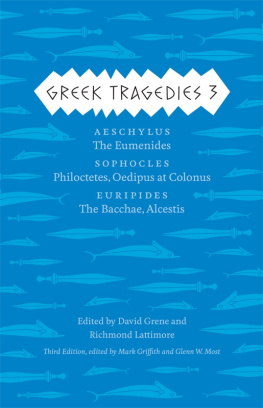
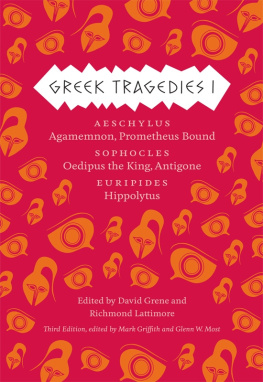
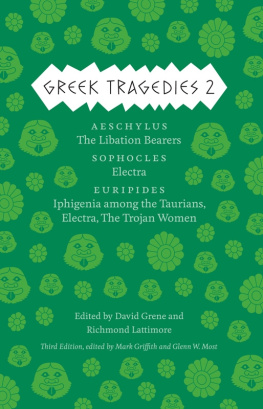

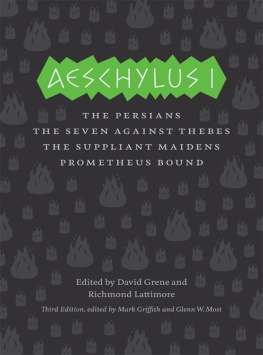
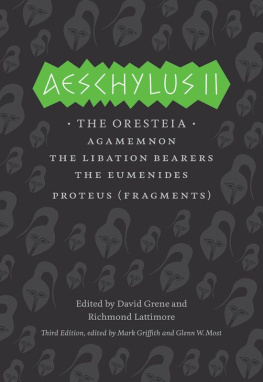
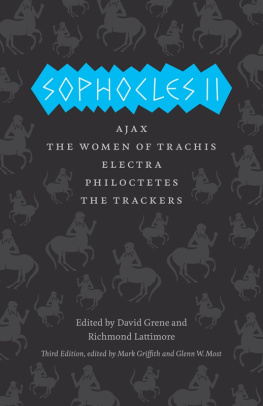
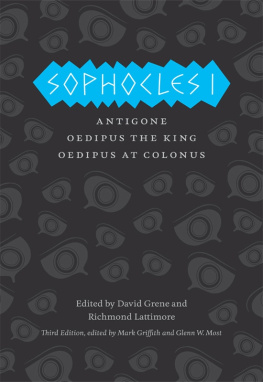
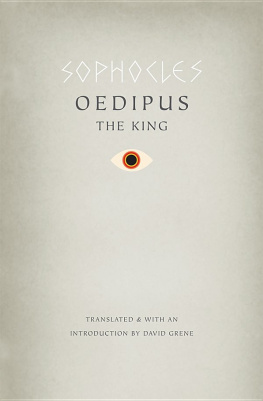
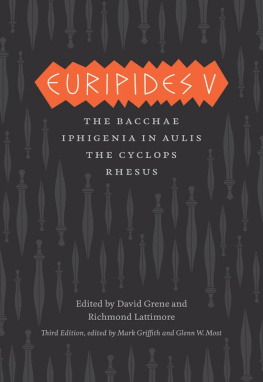
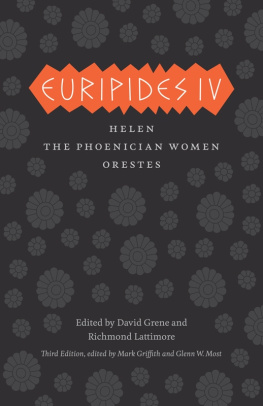
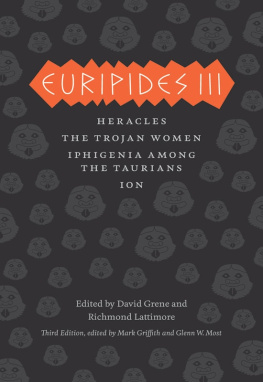
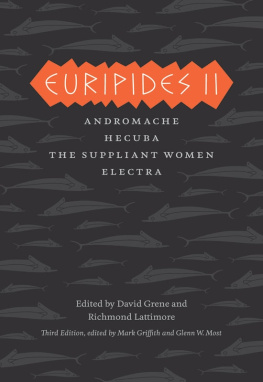
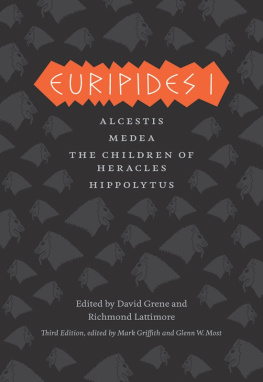
 This paper meets the requirements of ANSI/NISO Z39.481992 (Permanence of Paper).
This paper meets the requirements of ANSI/NISO Z39.481992 (Permanence of Paper).